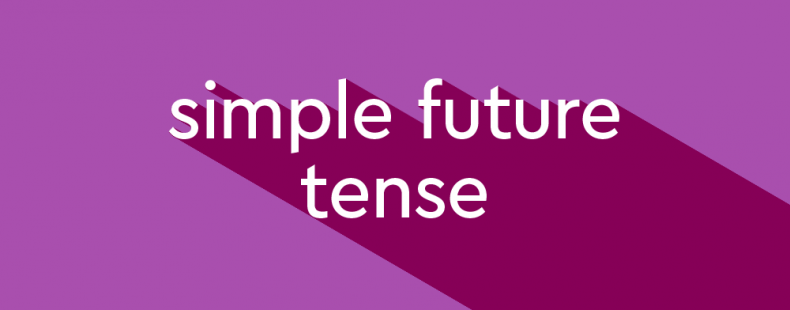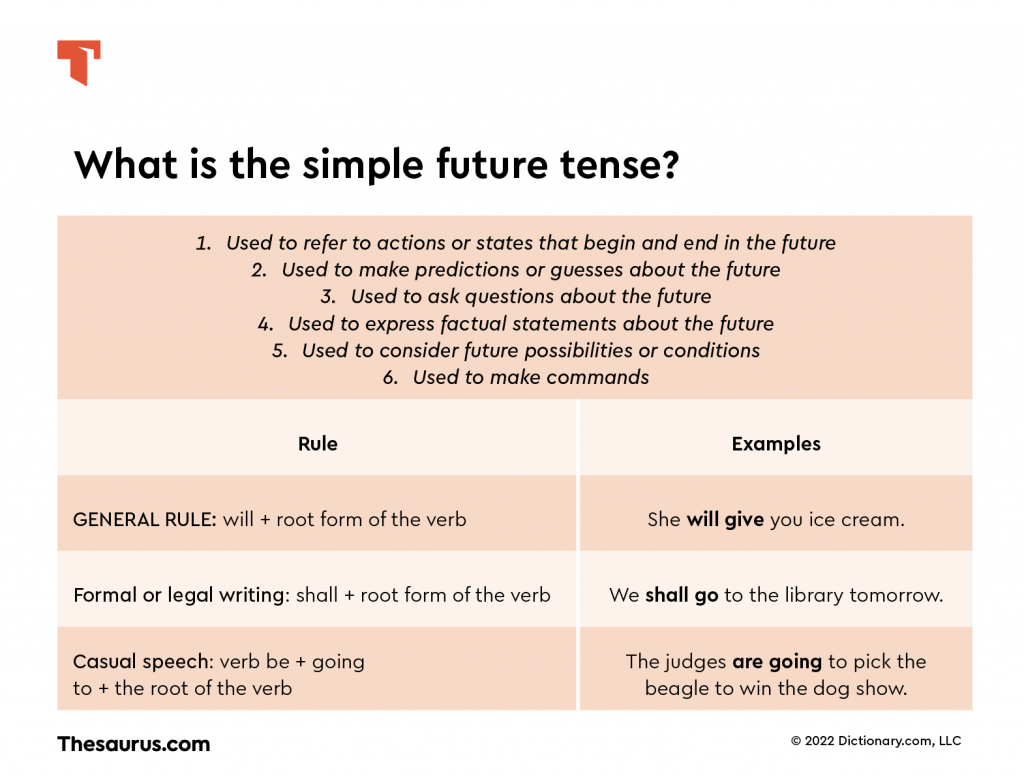Do you have any plans for tomorrow? Maybe you will eat a delicious breakfast alone, or you will go to a diner to enjoy a stack of pancakes with a friend? When you come home, you will watch TV or maybe you will browse social media. At the end of a long day, you will sleep in your bed. You might not do any of these specific things, but you will do something in the future. When we refer to things that will happen in the future, we often use something known as simple future tense.

What is simple future tense?
Verbs are words that we use to refer to actions or states of being. In English, verbs can be used in a variety of verb tenses. The tense of a verb, generally speaking, tells us at what period in time an action or state is happening. The particular verb tense we will look at is called simple future tense. Simple future tense is used to refer to events that will happen in the future.
It’s just as easy to talk about things in the past. Just take a look at the simple past tense.
When do you use simple future tense?
The simple future tense is used to refer to actions or states that begin and end in the future. These events have not happened yet, but will happen sometime in the future:
- I will meet her at the mall.
- The monkeys will eat any bananas that their handlers give them.
In general, we use the simple future tense for several different reasons. Here are some of the common reasons this tense is used.
1. Often, we use the simple future tense to make predictions or guesses about the future. These can be confident predictions or more uncertain ones.
- He said it will rain tomorrow.
- I think our team will win the baseball game.
- She is pretty sure that her cat will hate her new puppy.
2. We can also use the simple future tense to ask questions about the future.
- Will we find the pirate treasure?
- Will the Grinch discover the true meaning of Christmas?
3. We can also use the simple future tense to express factual statements about the future.
- It will be a leap year next year.
- This expensive soap will cost us more money.
4. We use the simple future tense to consider future possibilities or conditions.
- If I fail this test, my parents will take away my phone.
- She will only go to the party if her sister goes with her.
5. Finally, we can use the simple future tense to make commands.
- You will turn in your term paper on time, or else you will fail this class.
How to form simple future tense
The simple future tense is quite—how should we say—simple to form. To form the simple future tense, all you need to do is add the word will before the root form of the verb (the form of the verb you will find in our fantastic dictionary.)
For example, the simple future tense of sing is will sing, and the simple future tense of give is will give. This form remains the same regardless of if the subject is singular or plural. It also stays the same no matter which person (first, second, or third) the subject uses. In a rare case for verbs, there are no exceptions to this rule. Even infamously difficult verbs like be follow this rule: the simple future tense of be is will be.
Here are examples of sentences that use verbs in the simple future tense. As you can see, the form remains exactly the same regardless of what subject we use.
- I will run to the bank.
- She will be a superstar.
- The hungry hyenas will happily have hamburgers.
Sometimes, the word will is swapped with the word shall in the simple future tense. This form is not commonly used in regular writing and speech in English. Shall is most often used in formal writing or legal documents and court orders.
- The knights shall slay the dragon.
- Shall we dance together?
There is another form of the simple future tense that is used mostly in casual writing or speech. When speaking casually, we may form the simple future tense by using the following method:
- The verb be + going to + the root of the verb
When using this form, we conjugate the verb be so it agrees with the subject of the sentence. Check out these example sentences that use this casual form of the simple future tense. Take note of how the verb be is correctly conjugated depending on the subject of the sentence.
- I am going to do my homework later.
- My aunt is going to perform the surgery.
- The judges are going to pick the beagle to win the dog show.
How to make simple future tense negative
The simple future tense doesn’t get much more complicated when we want to make it negative. In order to make the simple tense negative, all you need to do is put the word not after the word will.
- I will not stop the music.
- My friends will not abandon me.
- She will not eat green eggs and ham.
We can also use a contraction. It is important to remember that the contraction of will not is won’t and not “willn’t.”
- I won’t be angry with my roommate.
- Matthew won’t visit tomorrow.
We’re positive you know all about apostrophes, but here’s a quick review for you.
When using the going to form, we place the word not after the verb be. Again, contractions can also be used.
- I am not going to sleep at all.
- Nicole isn’t going to like the movie.
- The crows aren’t going to be fooled by this awful scarecrow.
A simple trick for perfect grammar
Confused about verb tenses? Not sure if you’re using the future, future perfect, or future continuous tenses correctly? Check your writing on Thesaurus.com’s Grammar Coach™. This writing tool uses machine learning technology uniquely designed to catch grammar and spelling errors. Its Synonym Swap will find the best nouns, adjectives, and more to help say what you really mean, guiding you toward clearer, stronger, writing.















